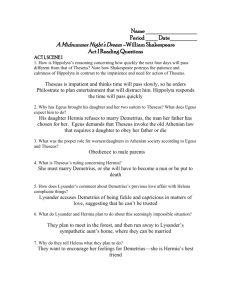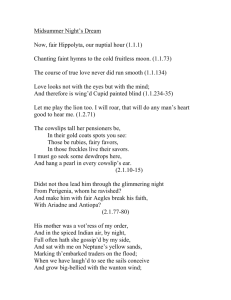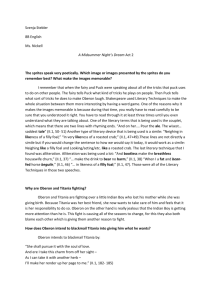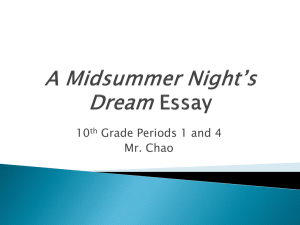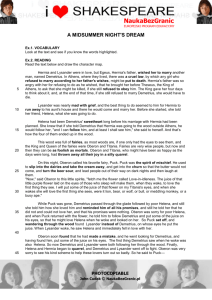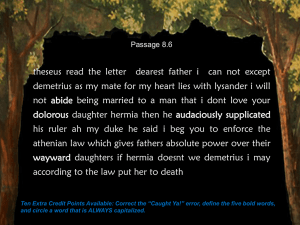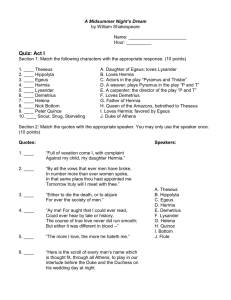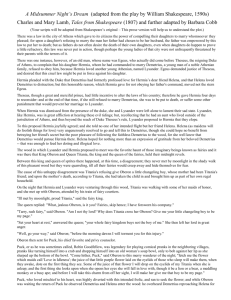Bill McEwan
advertisement
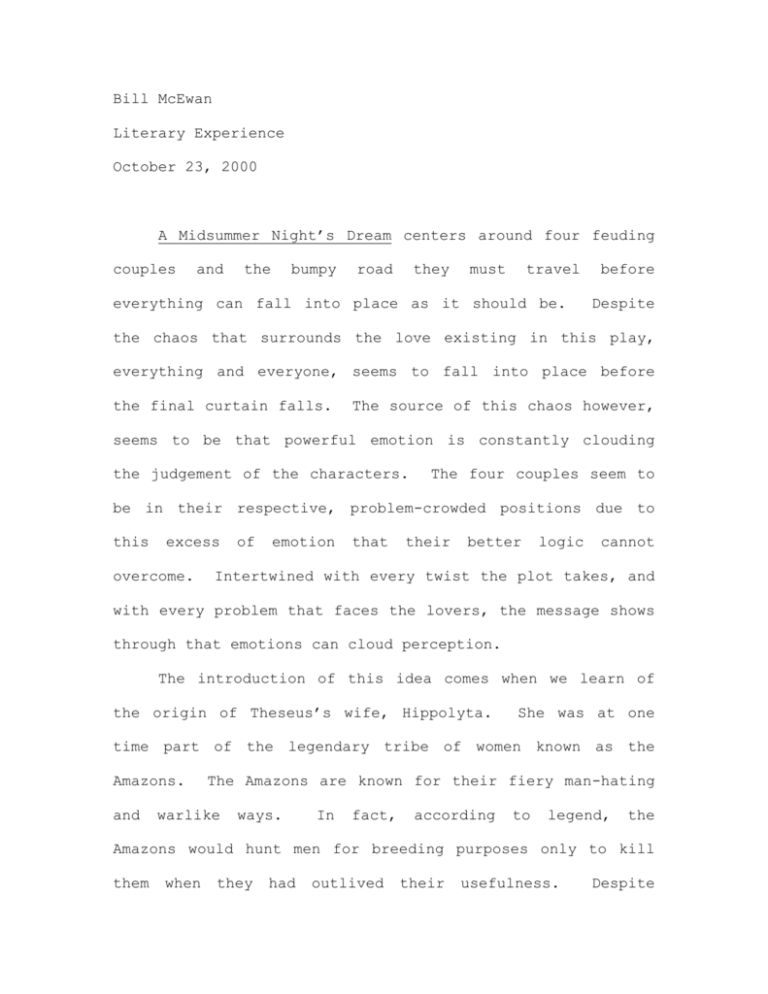
Bill McEwan Literary Experience October 23, 2000 A Midsummer Night’s Dream centers around four feuding couples and the bumpy road they must travel everything can fall into place as it should be. before Despite the chaos that surrounds the love existing in this play, everything and everyone, seems to fall into place before the final curtain falls. The source of this chaos however, seems to be that powerful emotion is constantly clouding the judgement of the characters. The four couples seem to be in their respective, problem-crowded positions due to this excess overcome. of emotion that their better logic cannot Intertwined with every twist the plot takes, and with every problem that faces the lovers, the message shows through that emotions can cloud perception. The introduction of this idea comes when we learn of the origin of Theseus’s wife, Hippolyta. She was at one time part of the legendary tribe of women known as the Amazons. and The Amazons are known for their fiery man-hating warlike ways. In fact, according to legend, the Amazons would hunt men for breeding purposes only to kill them when they had outlived their usefulness. Despite this, Hippolyta has given up the Amazon in favor of Athens, Greece, and made a husband of their Duke. think that strength, this that differences. was it the result can of overcome One may like to love showing even the its vastest Instead, their marriage was simply the result of a sword fight. Theseus perhaps became caught up in the desire to master someone who seemed to be unconquerable, Hippolyta perhaps in the idea of fighting for her freedom. Their marriage, because of the Theseus speaks already unusual, circumstance of winning of became its even origin. Hippolyta‘s love more In by so fact, injuring her. In the opening scene at the Athenian court another couple demonstrates how clouded their judgment has become on the face of powerful emotion. “So will I grow, so live, so die, my lord, Ere I will yield my virgin patent up Unto his [Demetrius] consents not to lordship, give whose unwished sovereignty.” (p. 5) yoke My soul Lysander and Hermia not only have the nerve to argue against Hermia’s father and the Duke of Athens, but also go as far as plotting an escape plan so that their love can continue without the interruption of the law of Athens. Perhaps Hermia’s motivation comes from a desire to defy her Father for what she considers, or would like to consider true love. Regardless, Hermia has far surpassed acceptable actions and now seems to act and speak as a fairy tale would, poetically, reality. and without very much attention to Through her powerful emotions, whether they are natural or labored, Hermia oversteps a boundry where most would classify her as obsessive rather than in “true love.” Throughout the play, Helena acts strictly according to her emotion. “I am your spaniel; and, Demetrius, The more you beat me, I will fawn on you.” (Helena p. 22) Here Helena displays a disregard for even her own importance as she compares herself to a dog in the face of Demetrius. In order to secure what she has decided will be hers, it seems Helena will go to almost any lengths, no matter how absurd. In addition to degrading and tells herself, she Demetrius of also her betrays daring her friend Hermia escape plan. This strong emotion Helena had, the inability to accept denial, carried her through much of her actions in the play. The last couple that makes up the play is the fairy King and Queen, Oberon and Titania. This couple, at the expense of their kingdom, has not spoken for over a year. Their current quarrel involves Titania has had under her care. a young Indian boy that Oberon wants the boy for his own and he ends up taking the boy only after drugging his own Queen. It seems Oberon has no other reason to desire the boy besides his jealousy and need to control Titania. His overpowering emotion in this instance not only splits a nation, but also allows him to perpetrate cruel tricks on his wife. A perfect match to the uncompromising Hermia, is the level-headed logical Lysander. naivety “You have her father’s love, Demetrius; Let me have Hermia’s. marry him.” (p. 6) of Do you As Hermia promises that even death will keep her from her love, Lysander makes logical arguments against the case of Egeus and Demetrius. Furthermore, when their argument with Theseus becomes futile Lysander decides on an escape plan that seems almost foolproof. “From Athens is her house remote seven leagues; And she respects me as her only son. thee.” (p. 8) There, gentle Hermia, may I marry While Lysander and Hermia plead their case as an appeal to a higher law, Demetrius argues with Athenian law on his side. Thy crazed “Relent, sweet Hermia, and, Lysander, yield title to my certain right.” (p. 6) This, Demetrius’s only addition to the argument, shows how little his true care is, and how confident he is that the law is on his side. It seems through most of the argument that he is uninterested as Lysander and Hermia plead their case. This comment comes only after Hermia downplays punishments she may receive for her disobedience. the It seems as if he was enjoying the little display until Hermia said she may rather accpept death before Demetrius. Gaining his attention only briefly, this comment seems to say enough is enough. Where Lysander was attentive to every aspect of Hermia’s situation, Demetrius speaks all of fifteen words throughout the entire argument. Although not as disinterested as Demetrius, Helena’s interest in the unfolding situation is of a very different nature than that of Lysander and Hermia. Helena incessantly searches for compliments with false flattery. “I give him curses, yet he gives me love.” (Hermia p. 9) “O, that my prayers could such affection move!” Helena p. 9) Despite this exchange, Helena believes that she is as fair as Hermia according to other Athenians. Hermia, in true character, confides to Helena that she and Lysander will flee Athens leaving Demetrius for Helena alone. Showing her true character in return, Helena decides to foil the escape attempt of Hermia to win some measure of favor from Demetrius. Where Hermia was honest, Helena speaks and acts with disregard for anyone but herself and her own desired position. Demtrius Helena. enters the woods followed by a begging “I am your spaniel; and, Demetrius, The more you beat me, I will fawn on you.” (Helena p. 22) Here Helena displays a disregard for even her own importance as she compares herself to a dog in the face of Demetrius. contrast this situation situation occurring in between the woods Lysander and is a To parallel Hermia. “Fair love, you faint with wandering in the wood; And to speak the truth, I have forgot our way. We’ll rest us, Hermia, if you think it good, And tarry for the comfort of the day.” (Lysander p 26) This vastly different encounter between the lovers not only shows contrasts of the couples, but also sets the scene for radical change that is about to befall the four Athenians. About the only similarity between Helena and Hermia is that they both pursue their love to the limits of their abilities. Hermia stares down the threat of death in order to prove her intent to Theseus and Egeus. Helena betrays a friendship in order to try to win some measure of gratitude from her love. After the scene at the Athenian court many of differences between the lovers can already be seen. through her discussion with Theseus, proves the Hermia that she desires Lysander with a pure love that she does not feel for Demetrius. “So will I grow, so live, so die, my lord, Ere I will yield my virgin patent up Unto his lordship, whose unwished yoke sovereignty.” (p. 5) My soul consents not to give With this line she tells Theseus that she will accept death, exile or any other punishment in order to not marry Demetrius. demonstrates Dionysian his like extreme love The infelxability of Theseus Apollonian between attitude Hermia toward and the Lysander. appeals to higher law - appeals to Egeus and Theseus wants relationship for love, wants relationship for status Lysander and Hermia represent the true love of youth. Unwilling to hear any voice that speaks against their love. Compare Hermia and Lysander with Helena and Demetrius. they are different, this will be the thesis. Say 1. appeals to higher law - appeals to Egeus and Theseus 2. wants relationship for love, wants relationship for status 3. act as foils to each other 4. after the decisions have been made the differences melt away into unimportance 5. Hermia and uncontrollable, Lysander young, represent innocent love. the Dionysian Demetrius is driven by ambition and pride. 6. both women pursue their loves (similarity!!!) 7. Hermia and Lysander – true love, Helena – unchanging love, Demetrius – inconsistent love 8. ***Hermia stared down death in order to stay with Lysander and especially will not bow to Demetrius cause Helena is in love with him. When L + H confide in Helena that she will have what she wants she only betrays L + H in order to win some measure of favor from Demetrius. 9. Lysander is level headed (comes up with escape plan) even in his most anxious hour 10. L + H realist the path true love must travel is not always easy Helena and Lysander are in love and there is no reason why they should not be wed. symbol. Demetrius wants Hermia as a status Helena wants Demetrius because of a one night stand the two had, and also probably out of jealousy to Hermia, that she has him and does not even want him. Gg The course of True love never did run smooth, act I scence 1 MSND. Goodnight sweet friend; my love ne’er alter till thy sweet life end, Act II scene 3 MSND. Oberon and Titania –
